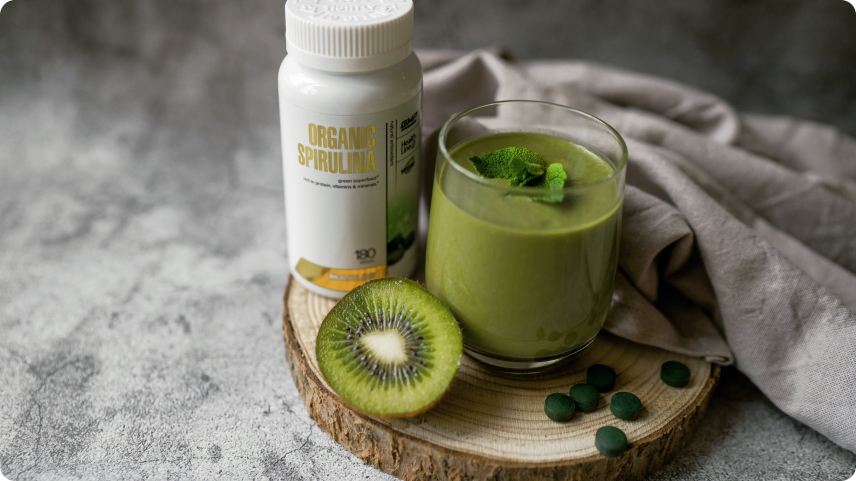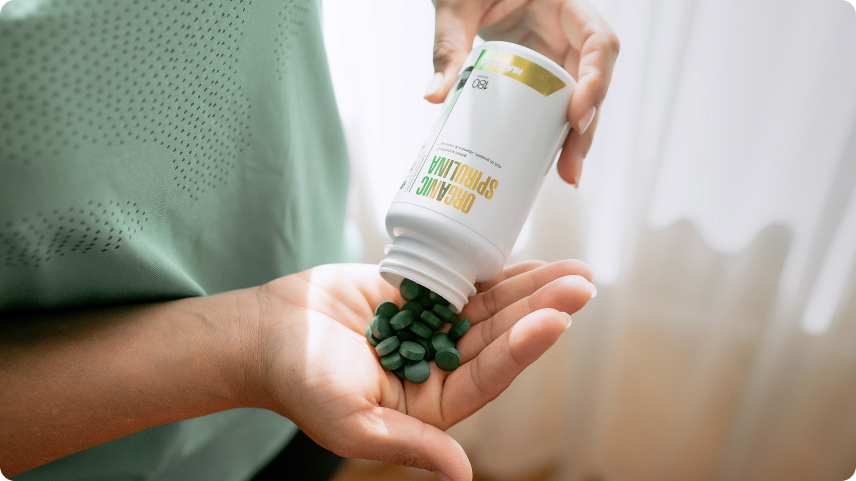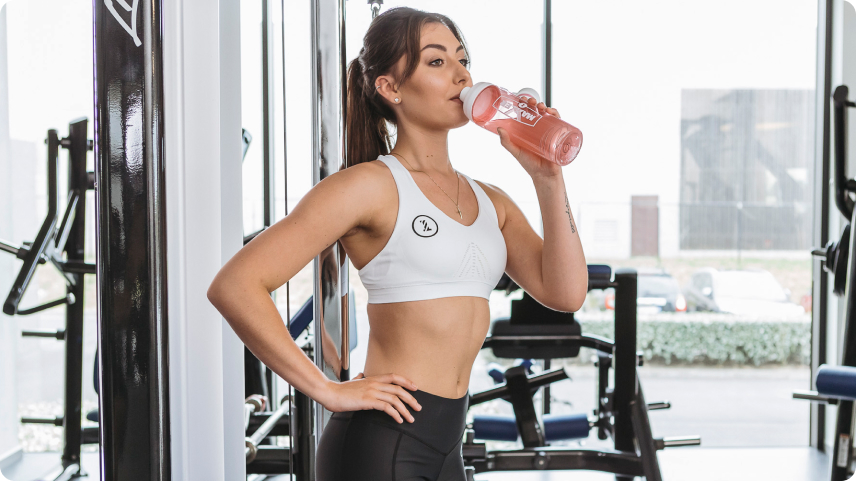Spirulina: Health Benefits

Spirulina: Health Benefits
What makes a food special enough to be given to astronauts? Spirulina made headlines when NASA declared it the food of the future. We've seen it added to smoothies, yogurt bowls, and other health foods. But what is the hype surrounding spirulina, and should you consider adding it to your routine?So, what is spirulina?
How do we define spirulina? Spirulina is a type of microscopic blue-green algae. It can carry out photosynthesis on its own and has little spiral filaments, which gave it its name. It has been used for food since the Aztec civilization. The dried-up mass of this alga is what we call spirulina powder. This alga grows in particular conditions, requiring alkaline water. It is only grown in certain countries, including Greece, India, Japan, the USA and Spain, where the perfect growing conditions exist.
Spirulina is safe to consume. The US Food and Drug Administration has regarded it as generally recognized as safe.
Spirulina is good for you and has many health benefits due to it being rich in nutrients.
Rich in nutrients
Spirulina can be considered a superfood due to its rich nutritional profile. Spirulina is an alga, making it a vegan product. This is excellent news for those following plant-based diets because it's a fantastic source of nutrients that many may not get in sufficient amounts.
Spirulina is about 70% protein by weight. Its high-quality protein includes all of the essential amino acids, making it comparable to animal sources of protein. Therefore, it’s a great way to get extra protein for those following plant-based diets.
Spirulina is also rich in omega-3 fatty acids and other polyunsaturated fatty acids. It contains both EPA and DHA, which are omega-3s that are rare in plant sources of fatty acids. When compared with ALA, which is the third type of omega-3 primarily found in plants, EPA and DHA have better bioavailability. That is because the body doesn't have to convert them into a usable form. ALA, on the other hand, has to be converted into DHA. This process is not very efficient in humans, making the bioavailability of omega-3s from plant sources lower.

Spirulina is also rich in key vitamins, including vitamins A, D, E, and K and the B-group vitamins.
- Vitamin A is a fat-soluble vitamin which helps support our vision and immune system.
- Vitamin D is vital for strong bones as it helps us take in calcium.
- Vitamin E is an antioxidant vitamin that helps protect our cells from free radicals formed when we burn fat for fuel.
- Vitamin K is essential for forming blood clots, which helps with wound healing; it is also an excellent vitamin for bone health.
- B-group vitamins do many different things in the body, but one of the most important ones is helping us make energy from the food we eat.
Vitamins are essential in supporting our general health, as the body requires them to carry out key processes. Plant foods are exceptionally rich in vitamin B12, which many plant-based people do not get enough of. Vitamin B12 is hard to find in plant foods and is instead found in animal products.
If you're wondering what some of these vitamins do in the body, check out our posts that go more in-depth:
- Vitamin B – its role and importance for the brain
- Folic acid, of vitamin B9 – what are its functions?
- Choosing vitamin D – all you need to know
- How does vitamin D support bone health?
- The health benefits of vitamin B12
Spirulina is a fantastic source of minerals as well, as it contains:
- Calcium, which is essential for healthy bones and muscle contraction
- Iron, which we need for red blood cell structure and function
- Selenium, which is excellent for immunity and thyroid function
- Iodine, which is also a great nutrient for thyroid function
Alongside these macro and micronutrients, there are also many biologically active compounds in spirulina. These include carotenoids, like beta-carotene, polyphenols and chlorophyll.
It's a powerful antioxidant
The many biologically active compounds in spirulina have antioxidant functions, which contribute to its health benefits. Antioxidants help the body fight free radicals, which can damage our cellular machinery or DNA.
There are many different types of antioxidants in spirulina. Some of them are the natural pigments present in it, like chlorophyll, beta-carotene, and phycocyanin. These can scavenge free radicals. Spirulina contains carotenoids and xanthophylls, which have double bonds that can take care of free radicals as well.
Spirulina contains antioxidants like catalase and superoxide dismutase, which are enzymes with antioxidant functions. In addition, it is rich in vitamins C, E, K, and B vitamins, which are potent antioxidants as well. Therefore, spirulina is a great source of powerful antioxidants to help support our general health.

May lower cholesterol
Cholesterol can be on many people’s minds. If you're trying to control your cholesterol and lower the bad cholesterol, spirulina may help. A meta-analysis of controlled trials has suggested that spirulina intake can help reduce overall cholesterol levels in people who have metabolic syndrome, are overweight or have diabetes. It can also help lower low-density lipoprotein cholesterol, which is commonly known as bad cholesterol. It can lower very low-density lipoprotein cholesterol concertation as well, all while increasing the levels of good cholesterol.
It may also help lower triglycerides. Triglycerides are fats that circulate in the blood and are typically how fat is stored in the body. Elevated amounts of triglycerides in the blood can increase the risk of heart issues and stroke. Although triglycerides are different from cholesterol, they're an important part of health as well.
It's good for your heart
Heart health is vital, especially as we age. After all, we all want to age while remaining active and not needing to worry about health issues too much.
One of spirulina's health benefits is its positive effect on heart health. One of the main risk factors for heart issues is the amount of fats, or lipids, in the blood. Spirulina appears to decrease levels of triglycerides and "bad" cholesterol and improve "good" cholesterol.
It may protect against cancer
The "C" word is a scary one for sure. Spirulina is an excellent source of nutrients, and it can beneficially affect our immune systems. Spirulina's connection to cancer has been investigated. Spirulina may be able to inhibit the growth of tumours due to its effect on immune signaling. A cell-based study suggested that it may decrease tumor growth as well. Spirulina's antioxidant content may have anticancer activity as well. An analysis of 100 patients on chemotherapy suggested that spirulina may be able to support their immune function and improve bone marrow activity, resulting in more blood cells.
Metabolism support
Spirulina benefits include supporting our metabolism. It may be a good supplement for those who are trying to lose weight. Doses of 1-2 grams a day may be helpful in reducing both body weight and BMI. It may also assist with decreasing waist circumference. It appears that spirulina’s phenylalanine content helps affect our appetite center in the brain.
The way our body processes glucose is a part of our metabolic health. Spirulina supplementation may help the body be more sensitive to insulin, helping improve insulin resistance. This effect has been observed in those with type 2 diabetes and those with extra weight. Spirulina's protein and fiber content are likely contributors to this effect. In addition, part of this effect has been attributed to its lowering of specific signaling molecules that result in lower glucose uptake by muscle and fat cells.

If your waist circumference is a concern to you, check out our guide to belly fat weight loss.
Reduces blood pressure
One of the key concerns for many of us is being able to manage our blood health. Hypertension can be a risk factor for many different types of health conditions. Consuming spirulina may be able to lower blood pressure and even improve the stiffness of blood vessels. It can be used alongside other medications to further improve its benefits as well.
If you're worried about your blood pressure or any other aspect of your health, remember to consult a medical professional. Spirulina isn't a medicine but can be a good addition to both a healthy routine and your regular medication.
It could help relieve allergy symptoms
Spirulina has anti-inflammatory properties due to its ability to stop histamine release. Spirulina affects our immune system and can lower signals that regulate allergic reactions. It may be helpful in supporting those who suffer from allergic rhinitis - a stuffy or runny nose during allergies.
However, spirulina itself might be an allergen, so make sure you rule that out before using spirulina.
Improves mental health
If you're ready to start drinking spirulina, you need to know how to choose the best spirulina supplement. There are a few things to look out for when selecting your spirulina.
- Look for the right color. Spirulina should be a deep green color with a bit of a blue hue. This is especially important when buying fresh spirulina or spirulina powder.
- Fresh vs dried. Some people may opt for fresh spirulina supplements. Others may prefer dried powders or tablets for convenience. Decide which form of spirulina you prefer to take as a supplement.
- Spirulina form. Spirulina supplements can come in powders or tablets. Pick the form that works best with your routine. Some people prefer adding powders to drinks and smoothies, while others appreciate the convenience of a tablet. Tablets may be great for those who are frequently traveling too.
- Quality. Pick supplements which are open about their quality. High-quality growing environments and adequate nutrition ensure that your spirulina is full of nutrients. In addition, it's a good idea to make sure that the spirulina supplement is contaminant free. This can usually be done by looking for third-party certified and tested spirulina supplements or requesting more information about the spirulina from the seller. Maxler Organic Spirulina is organic and is made in IFS and GMP-certified factories to ensure that you get a high-quality product.
- Ingredients. If you're choosing spirulina powders or tablets, it's a good idea to check ingredient lists. In addition, check serving sizes to understand how much spirulina you're actually getting. Look out for lots of ingredients or potential fillers. Maxler Organic Spirulina tablets only contain spirulina and magnesium stearate, which helps the tablets keep shape and prevents them from sticking to each other.
Spirulina has many health benefits that make it a great supplement. However, it's important to remember that spirulina is not a magical solution to good health. Combine spirulina with a healthy routine that includes plenty of movement, relaxation, proper sleep and good nutrition. Together with these great habits, spirulina can help you support overall health and get an extra nutritional boost.



